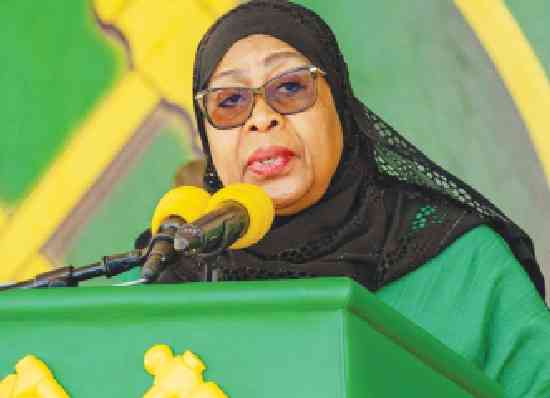
They say the hand that rocks the cradle rules the world — and perhaps it should. But that power must be exercised with responsibility, accountability and a firm grip on good governance. Samia Suluhu Hassan’s rise to Tanzania’s presidency has sparked fresh debate about leadership, transparency and the future of women in African politics.
This piece isn’t about praising or criticising Hassan’s record. Instead, it draws seven cautionary lessons — the pitfalls women in politics must recognise, anticipate or overcome if they are to lead effectively and endure.
These lessons rest on the timeless foundations of sound governance: legitimacy, accountability, transparency, inclusion and respect for democratic principles.
Using Hassan’s leadership journey as a focal point, the discussion aims to move beyond one individual to extract broader and transferable insights.
The analysis draws from credible research on governance, elections and gender in politics, in Africa and beyond in order to illuminate what women leaders face and what the systems around them must evolve to support their ascendancy to power.
l Don’t mistake continuity for legitimacy: Political continuity may project calm, but without credible and transparent processes it risks eroding public trust. Stability headlines, signalling propaganda, often easily mask procedural flaws that chip away at legitimacy. When that happens, the nation becomes a fertile ground for uprisings. For women leaders, the lesson is clear: credibility must rest on process, not personality. Building legitimacy through open rules, independent verification and visible accountability is key. Strengthening and adequately funding electoral commissions, publishing trackable policy milestones and ensuring there is safe spaces for citizens to contest results through transparent, lawful channels are prerequisites. True legitimacy is earned, not inherited nor forced upon.
l Don’t centralise power — share it wisely: Centralising authority tends to offer speed and a semblance of expediency, but it often breeds opacity and weakens accountability. For women leaders, overreliance on close circles reinforces the stereotype that political power is personal rather than institutional. The antidote is inclusion. It is an imperative to strengthen cabinet procedures, empower parliamentary oversight and keep citizens engaged in decision-making. Leadership gains durability when power is distributed through rules, not relationships;
l Don’t weaponise messaging: Spin doctoring may win headlines, but it corrodes trust. Like milk, when trust spills, it is impossible to gather it back. When rhetoric replaces substance or data is selectively used, polarisation deepens and credibility suffers. Women leaders have an opportunity — and a responsibility to model evidence-based communication. Great politicians are transparent about uncertainties, cite data sources and listen to public feedback. Contrary to popular view, openness does not weaken authority, it builds it. Ethical communication is the quiet power that sustains legitimacy long after slogans fade;
- Deadly attack targets Somalia food convoy
- We were sad to see ED in Rwanda: Ndiweni
- Coal rush! Energy crisis fires global hunt for polluting fuel
- Tanzania's president urges women to have fewer babies
Keep Reading
l Don’t silence dissent: Suppressing opposition, through intimidation, disappearances or even murder, curbing press freedom or side-lining civil society might realise short-term control, but always erodes democratic resilience. Healthy governance needs contestation — a space for different voices to challenge and refine power. Women leaders who protect that space not only strengthen democracy but redefine leadership strength. Protection of journalists, upholding due process for opponents and inviting civil society into policy design ought to be top of mind interventions. Inclusion, not intimidation, is the hallmark of lasting authority;
l Don’t confuse economic growth with political credibility: Economic gains lose meaning when cloaked in opacity. Without transparent budgets, independent audits and verifiable data, even real progress looks suspicious. Women leaders should make transparency their signature — open budgets, public dashboards and independent verification ought to be the order of the day. Visible accountability not only validates achievement, but builds a durable base of trust. Growth without proof is propaganda, transparency turns numbers into national confidence, heightening political credibility;
l Don’t outsource accountability: International praise is flattering, but domestic legitimacy can never be imported. True accountability begins at home, in institutions that citizens can see and trust. For women leaders, balancing global partnerships with strong local oversight is key. Welcome observers, but keep ownership of reform. Build transparent data systems, empower domestic watchdogs and ensure citizens drive the accountability agenda. Global respect follows when governance credibility starts within at home; and
l Don’t ignore the barriers women face: Symbolic victories are not systemic change. Gender bias, harassment and resource inequities still keep many capable women out of politics or push them out too soon. Real progress demands structural reform — from gender quotas and mentorship programmes to safe workplaces and caregiving support. Women leaders who champion these reforms extend opportunity beyond themselves. The goal is not just representation, it is transformation.
Lessons from Tanzania, continent
Governance, whether in Tanzania or across Africa, rises or falls on the credibility of its institutions, not the charisma of its leaders.
Scholars of democracy have long argued that legitimacy cannot be staged. It must be proven through verifiable performance. As political scientist Michael Bratton observed, the appearance of calm is no substitute for the substance of accountability.
In East Africa, the cycle is familiar: when elections are seen as credible, citizens trust their leaders. When legitimacy is contested, governance falters. Across the continent, evidence continues to affirm that checks and balances are not bureaucratic hurdles, but pillars of stability.
From Acemoglu to Ostrom, research shows inclusive systems — where power is dispersed and accountability enforced — yield better governance and less corruption.
The World Bank’s findings echo this: societies that embed transparency and inclusivity into governance structures consistently record higher legitimacy and resilience. Communication, too, is a form of governance. In an age where misinformation spreads faster than policy, political credibility depends on how leaders speak and what they disclose.
Studies on political communication remind us that transparency in messaging builds trust, while propaganda corrodes it. A responsible leader must therefore treat information as a public good, not a political weapon.
Freedom House and the Journal of Democracy have long-established the connection between civil liberties, media freedom and innovation in governance.
Restricting these spaces may offer short term political control, but it suffocates the very oxygen of democracy. The same applies to fiscal governance — without transparent budgets and open data, even impressive growth loses its power to convince. Investors and citizens alike are drawn not to rhetoric, but to the verifiable integrity of institutions.
In global governance, a subtler caution emerges. Praise from abroad often flatters, but real legitimacy must be earned at home.
Scholars such as Drezner, remind us that nations erode their sovereignty when they outsource accountability. True governance maturity lies in building institutions so credible that both citizens and the world trust them without external endorsement.
Finally, gender and governance remain inextricably linked. Research by Krook, Dahlerup and others confirms representation without reform achieves little.
Quotas, mentorship and structural protections matter, but they must be backed by party systems and political cultures that value women’s competence as governance capital, not as token symbolism.
Implications for Tanzania, Africa
Tanzania’s experience underlines lessons that resonate across the continent. Strengthen institutions. Independent electoral bodies, an impartial judiciary and credible anti-corruption agencies are the foundation of legitimacy and the shield against gendered scepticism when women lead.
Institutionalise transparency
l Open budgets and data reporting empower leaders — particularly women — to prove competence through evidence, not narrative;
l Protect civil society and media. These are not opposition forces, but partners in accountability and innovation;
l Build leadership pipelines. Mentorship, funding and safeguards against harassment must become non-negotiable tools for inclusion; and
l Reframe leadership around values. Integrity, service and performance outlast personality.
Conclusion: Legitimacy as true test
The seven cautions drawn from Hassan’s political leadership evolution offer a mirror for women leaders across Africa. Leadership is not about inheriting a stable system, but about deepening its legitimacy.
When women in power insist on credible institutions, ethical communication, transparent governance and inclusive participation, they redefine what authority looks like.
Africa’s future will not be shaped by those who simply hold office, but by those who make governance accountable, participatory and just. For women leaders, that is both the challenge and the opportunity — to move from symbolic presence to substantive transformation, one credible institution at a time.
Ndoro-Mkombachoto is a former academic and banker. She has consulted widely in strategy, entrepreneurship, and private sector development for organisations in Zimbabwe, the sub-region and overseas. As a writer and entrepreneur with interests in property, hospitality and manufacturing, she continues in strategy consulting, also sharing through her podcast @HeartfeltwithGloria. — +263 772 236 341.











